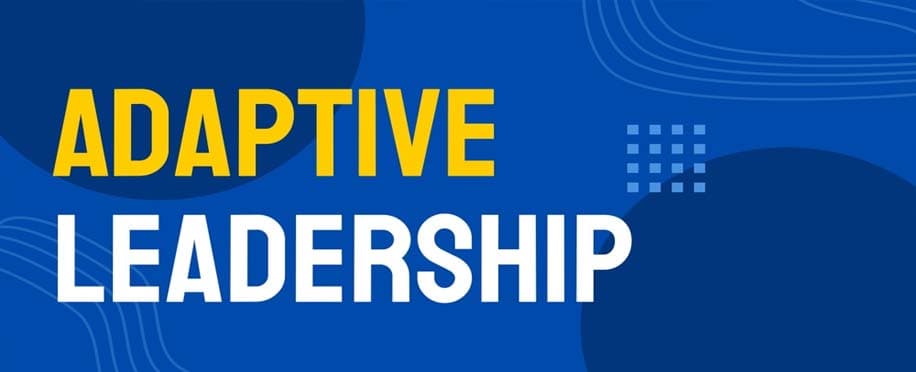Copyright © 2026 lpcentre.com All Rights Reserved. London Premier Centre For Training Ltd Registered in England and Wales, Company Number: 13694538
version: 3.0.1

Posted on : 6/27/2023, 10:21:04 PM
Last Update : 1/3/2024, 5:20:25 PM
In today's rapidly changing and unpredictable world, the adaptive leadership framework is becoming more and more important for organisations in their strategies to adapt to trials and solve problems.
Adaptive leadership style is not limited to a specific industry or business type, moreover, it has the advantage of going beyond the traditional framework and instead emphasises flexibility, innovation, and the ability to respond adeptly to changing circumstances.
In this blog, we will identify the adaptive leadership approach, talk about its 4 As, and share with you the cited Heifetz principles of adaptive leadership.
Adaptive leadership is a practical leadership framework and mindset that focuses on effectively leading people through hard challenges. As an adaptive leader has the ability and required skills to navigate through challenges, drive change, and motivate individuals and organisations to thrive within uncertainty.
Moreover, unlike traditional leadership approaches that rely on fixed plans, practical leadership believes that problems and situations are often changing and require designed solutions.
Thus, adaptive leadership requires a leader with a growth mindset, actively learning from his/her experiences, and continuously adapting his/her strategies and behaviours to new challenges.
That is why developing resilient leadership and adaptive leadership, helps organisations to practise agility, empower their employees, and navigate the difficulties of a rapidly changing world with the right tools and tactics.
These four dimensions are the foundation of practical leadership, which enable a leader to navigate environmental complexity, and unexpected issues, inspire others, embrace change, and drive meaningful progress to any framework.
Anticipation involves the ability to identify and understand potential future challenges, opportunities, and trends, then creating thriving answers and responses to protect the company's achievement.
As an adaptive leader works to gather insights, scan the market, and analyse data to anticipate possible disruptions or changes.
Articulation refers to the skill of delivering a convincing vision, purpose, and direction among ambiguity.
Thus, adaptive leaders share their ideas, values, and goals in an understandable way to others. By engaging with them in an open and transparent communication model.
Adaptation is the basic concept of adaptive leadership theory, as it includes the ability to achieve practical adjustments to strategies, plans, and approaches based on changing circumstances.
All of that can be done with adaptive leaders' ability to emerge flexibility through plan execution and diagnose any delay in the progress.
Therefore, flexibility, creativity, and experimentation are the ultimate mindset of adaptive leaders.
Accountability stands for taking ownership and responsibility for actions, decisions, and outcomes.
As in adaptive leadership, a culture of accountability is created, where individuals understand their roles and commitments. Moreover, are accountable for their performance, and decisions.
Ronald Heifetz, a renowned leadership expert, defined these key principles that support the process of adaptive leadership.
These principles provide a fundamental framework for leaders to effectively handle complex challenges and drive adaptive change, regarding social and technical types of situations.

Adaptive leadership identifies emotional intelligence as the ability to understand and manage one's own emotions and the emotions of others through regular or difficult times.
Thus, emotional intelligence plays a crucial role in building relationships, fostering empathy, and effectively communicating with individuals in public.
Keep in your mind that adaptive leaders with high emotional intelligence can navigate challenging situations, inspire trust, and flourish in a positive work environment.
Effective and strategic leadership highlights fairness and equity within an organisation, as a framework to boost fair treatment of employees, equal distribution of existing resources and opportunities, and transparent decision-making processes.
Therefore, adaptive leadership promotes organisational justice as an essential principle when dealing with adaptive challenges that face a business.
In other words, personal and professional improvement, as adaptive leaders must prioritise continuous learning and development of themselves and their teams as a way to be able to face the changing challenges of the business world.
Thus, an adaptive leadership framework must invest in leadership and management training courses in Dubai to develop skills and enhance individual and collective capabilities.
All the ethical values, integrity, and moral qualities of an adoptive leader, as he/she must prove strong character by keeping ethical standards, being authentic, and acting in the best interests of the organisation and its stakeholders.
Therefore, the leader shows honesty, accountability, and a commitment to ethical decision-making to build trust and credibility.
Win-win problem-solving focuses on finding mutually beneficial solutions that address the needs and interests of multiple stakeholders.
In adaptive leadership, leaders seek collaborative problem-solving approaches that go beyond win-lose scenarios, by encouraging open dialogue, active listening, and creative problem-solving techniques to generate innovative solutions that satisfy various perspectives.
Adaptive leadership is the required framework for your business to succeed in a world of variation and uncertainty, with all its flexible principles and amazing benefits.
However, to change to adaptive leadership, you need to train and empower your leaders to grow their skills and potential.